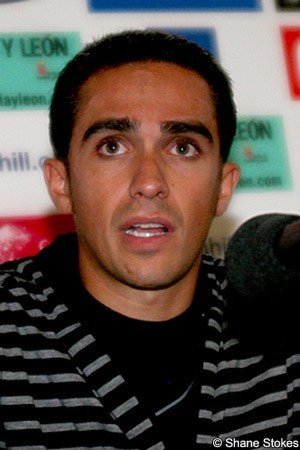Says relations with Astana are very bad and he hasn’t been paid in months
 Spanish rider Alberto Contador has once again proclaimed his innocence, saying that he has been a regularly tested rider throughout his career, and that he has done nothing wrong.
Spanish rider Alberto Contador has once again proclaimed his innocence, saying that he has been a regularly tested rider throughout his career, and that he has done nothing wrong.
“People do not distinguish between fifty picograms of clenbuterol and other things much stronger. I have not won the Tour because of five picograms of clenbuterol,” he told ABC. “I have doping controls every six days per year, at home, in competition, when I train. I have always been controlled and that seemed a good thing to me. And always, throughout the years, I have had the same regularity, I got the same number of victories. There is no catch.”
Contador has been spending time at the Saxo Bank-SunGard training camp in Fuerteventura, getting to know the riders who, depending on the outcome of his case, will be his team-mates, and with whom he hopes to fight for more Tour de France titles.
He has said several times that he feels a lot of support from Bjarne Riis and his team. The same can’t be said of the squad he has been with since 2008, however.
“In the case of my former team, Astana, [things are] very bad,” he said. “After winning two Tours, a Giro and a Vuelta with them, they have not even issued a statement of support. And I have not been paid since September.”
Contador won the third Tour de France of his career in July, but then in September it was revealed that he had failed a test for Clenbuterol. The sample was taken on the second rest day of the Tour, one day before the showdown on the Tourmalet. He has insisted that it is a case of accidental ingestion of the banned substance, which he says was in meat purchased in Irun and eaten in Pau.
The explanation has been given a very mixed reaction. He knows there is a history of high-profile riders testing positive, claiming they are innocent, but being shown to have doped. He insists that this case is different. “I know that many others have gone through this and I can appear to be one more. I know that many arguments may sound like excuses and stories that have already been seen. But it is reality. I have not done anything.
“I still consider myself an example of transparency, cleanness. All this will end one day. I wish that people who write, think or speak, could eventually consider the possibility that I have not done anything.”
Contador is aware that he risks being asked to pay a sum totalling 70 percent of his annual salary if he is found guilty. He said that he hasn’t given any thought to this, but rather being more concerned by how the perception of him has changed and how people might now regard him after the positive test.
“What most concerns me, what has me thinking, is that the prestige that you get from winning the Tour, Vuelta and the Giro, the image I had built over the years, the honor of work and hours of effort, all this is going overboard,” he said.
He feels that it would be different if he was not a cyclist. “I am envious of other sports. Agassi said in a book that he had doped and nobody considers him a criminal. But a rider, yes…”
Contador’s case is currently being considered by the competition committee of the RFEC, the Spanish cycling federation. UCI rules state that disciplinary processes should be completed within a month, but the RFEC has indicated that it might take up to three months. This would expose the federation to fines and, if it extends past that timespan, to a CAS action.